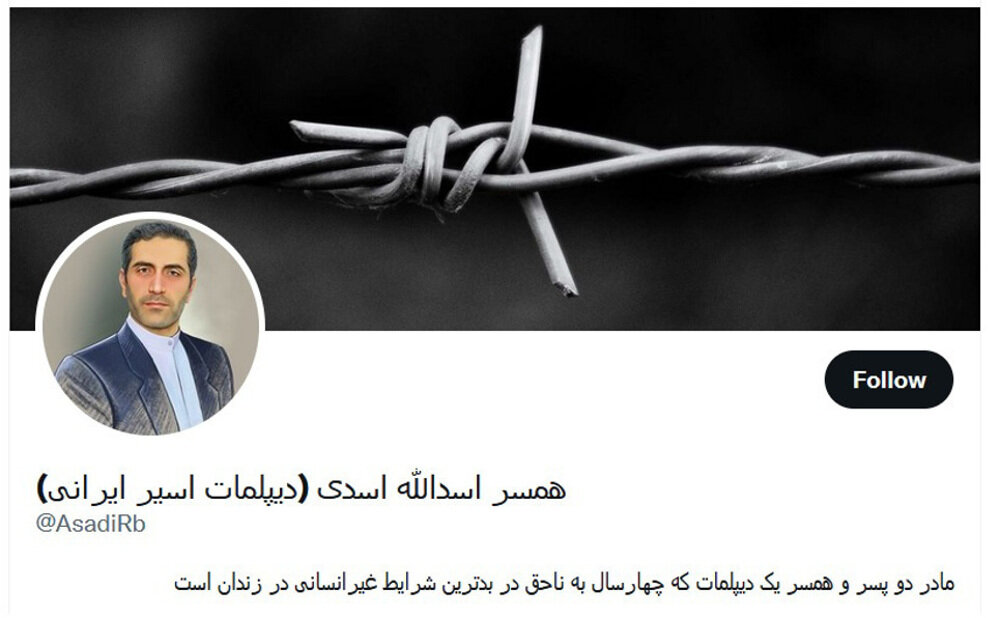Assadi's wife describes agonizing plight of husband

TEHRAN - The wife of Assadollah Assadi, an Iranian diplomat detained in Germany in 2018 on fabricated allegations and presently serving a 20-year jail term in Belgium, has detailed the agonizing experience her husband has gone through.
The news was revealed by Assadi's wife on Sunday in a series of tweets, exposing some of the harsh treatment he received from purported European human rights defenders when he was being held in Germany and now in Belgium.
She referred to the Iranian diplomat's struggles throughout his 101 days of incarceration in Germany, stating that he spent a total of 28 days in a bunker without little access to water or hygienic facilities.
"In the bunker (for a total of 28 days), I was prohibited access to water and had to request it through phone. If the guards came on time, which was frequently late, they would give me water in a paper cup through the hatch door,” the wife quoted her as saying.
Water was obviously crucial to him since, in addition to drinking, he also required it for ablution before praying.
“I was only allowed to brush my teeth once in the morning. Only once I was allowed to wash my hands with soap; only once I was allowed to dry my hands with a towel.”
Assadi was also said to have had his stuff taken from him and been subjected to repeated invasions of his privacy while being kept under psychological duress by the guards.
“My glasses were confiscated in the bunker every evening and the next day they returned them at my request. In recent days, I managed to get a pen and paper from them. The pen was also taken in the evening,” the diplomat stressed.
“In the conditions of being kept in the cell, I could take a shower with the door closed while bathing. But in the bunker, accompanied by the guard, I was taken to the distribution room where clothes and hygiene items are stored and there was a shower without a door, and I had to shower in front of the guard, and the guard was obliged not to take his eyes off me,” he pointed out.
The Iranian diplomat had undergone protracted and forceful interrogations while in police detention, according to subsequent tweets from his wife.
“Throughout the entire interrogation, they tried to fabricate evidence for their unjust accusation by telling blatant lies,” he was quoted as saying. “In a really condescending manner, in order for me to speak in line with their views during the interrogation, they tried to pressure me through all strictures and prepare me for a forced confession.”
Legal experts believe that Assadi's case is founded on false accusations that lack supporting evidence and has the appearance of being political propaganda against the Islamic Republic.
In June 2018, Belgian officials said that two persons in Belgium had received homemade bombs from an Iranian diplomat after Belgium's police had stopped a vehicle carrying the contraband. He was charged of preparing an assault against the terrorist group Mujahedin-e-Khalq (MKO), which the Iranian government vehemently denies.
Since the 1979 Islamic Revolution, the MKO has carried out several killings and bombings against senior Iranian figures.
About 12,000 of the almost 17,000 Iranians who have been murdered in terrorist assaults since the Islamic Revolution have been victims of the MKO.
The bombing of the Islamic Republic Party's headquarters in Tehran in 1981, which killed Ayatollah Mohammad Hossein Beheshti, the head of Iran's judiciary at the time, as well as 72 other figures, including MPs and ministers, was one of the group's most significant attacks.
Members of the terrorist organization departed Iran for Iraq in 1986, where they were supported by Saddam Hussein, who was famous for his brutality.
The MKO, which is presently located in Albania, was listed as a terrorist organization by the U.S. government up until 2012. Its leader Maryam Rajavi has developed strong relationships with Western leaders after being delisted.
